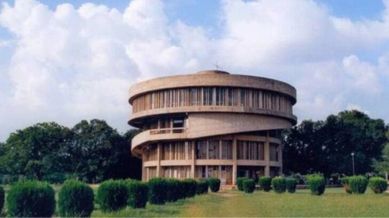Stay updated with the latest - Click here to follow us on Instagram
From debate to silence: Is PU scripting a new campus normal?
Recently, the university directed students to submit an affidavit restricting their fundamental right to protest under Article 19.

Written by Deeksha, Manpreet, Srishti, and Jatinderjeet
Lead us from darkness to light. This emblematic phrase of Panjab University reflects its founding vision: to spread knowledge, encourage critical thinking, and nurture active citizens. Yet today, there is a growing gap between this ideal and ground reality.
Recently, the university directed students to submit an affidavit restricting their fundamental right to protest under Article 19. This move threatens the very principle PU was built upon, dimming the light it sought to uphold. The Panjab University Act, 1947 vests the Senate with superintendence over university affairs, but its dissolution since October 2024 raises questions about the affidavit’s legality.
The affidavit’s first clause requires prior permission for any protest, dharna, or rally. This begs the question: Is protest a right or a privilege? It also states protests must involve “genuine and justifiable grievances”—but who decides what qualifies? Further, protests are to be held at a designated site near the police chowki, far from the offices of higher authority, defeating the purpose of visibility and impact.
If a student violates these terms, PU can debar them from exams. Repeated violations may lead to admission cancellation, campus bans, and derecognition from elections. Notably, this rule targets only newcomers, not existing students. The administration avoids open confrontation by imposing it on freshers—students unfamiliar with PU’s culture of debate and dissent, grateful to secure admission, and least likely to resist. It is a calculated move to shape a generation that learns silence is safer than speech.
The right to education and the right to protest complement each other. Dissent is integral to academia; it refines institutions. Critics argue that protests disrupt decorum, but historically, they have driven positive change. In 2018, PU students protested for 48 days for 24×7 hostel access for women, and the administration finally ended gender-biased curfews. Similarly, in 2017, after an unprecedented 40–1100% fee hike, protests reduced it to 10% for new students and 5% for existing ones.
The affidavit also bars outsiders from protests—yet ensuring campus security is the university’s job, not students’. This year, a student was killed by outsiders whom PU security failed to stop. During elections too, the administration depends on Chandigarh Police, exposing deep security lapses.
Contrast this with 2015, when a student referendum saw 52% opposing four-wheeler entry into campus—a progressive move by collective student will. Today, such politics is a relic. As Deepak Nayyar, an economist and academic, observes, “Students are either caught up in the same party-political unions or opt out to concentrate on academics.” Those who remain active fear legal repercussions, making such compromises “self-destructive as acts of commission and omission.”
Student politics at PU has deteriorated—dominated by money, muscle power, sponsored elections, flashy rallies, hollow promises, and scripted speeches. The new affidavit will worsen this, discouraging progressive participation while ignoring structural flaws in student politics.
Universities should foster doubt and dissent, not suppress them. By seeking “ordered” protests, PU mocks democratic resistance. Change must arise collectively from students across departments to prevent this from becoming the new normal.
(The authors are pursuing Masters in Political Science, 2nd year, Panjab University)